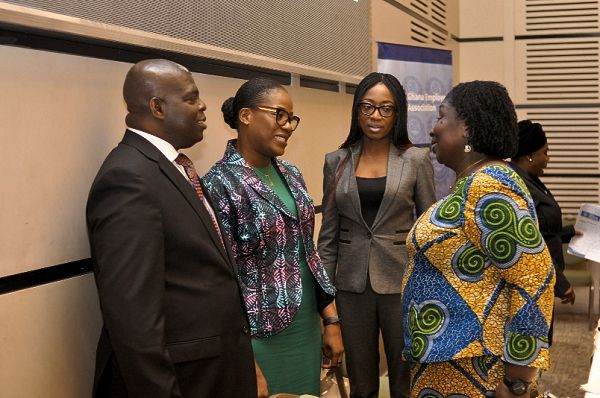
Pay employees on maternity leave from pension contributions - H/R officer suggests to govt
An Industrial Relations Officer, Mrs Rose Kakari-Annan, has suggested to the government to allow corporate organisations and small and medium firms to use part of pension contributions of their employees to pay their maternity leave.
She argued that some of these organisation were unable to pay their female employees when they proceeded on maternity leave, due to financial constraints, pointing out that, the suggestion, when adopted in Ghana, would help women to save their jobs, reduce the cost of burden of maternity leave on employers and motivate women to have children after getting employed.
Advertisement
Addressing a two-day conference attended by women in the Human Resource (HR) profession in Accra to discuss ways to improve and enhance their career prospects and advancement in the corporate world, Mrs Kakari-Annan who is also the Deputy Chair of the National Labour Commission (NLC) and a Human Resource Expert, argued that some organisations were unable to pay their female employees when they proceeded on maternity leave, due to financial constraints.
According to Ghana’s labour laws, a female worker, on production of a medical certificate issued by a medical practitioner or a midwife indicating the expected date of her confinement, is entitled to a period of maternity leave of at least 12 weeks in addition to any period of annual leave she is entitled to, after her period of confinement.
Advanced countries
She explained that the policy, which was practised in advanced countries, did not require employers to pay their workers who go on maternity leave, but rather allowed individuals to draw against their Social Security benefits to cover their maternity leave.
The two-day conference was organised by the Ghana Employers Association (GEA) on the theme “Women in HR and the future of work”.
The meeting brought together women in HR from the various corporate and public sectors in the country to create the platform for them to share experiences and practices that would help them to enhance their profession.
Mrs Kakari-Annan said a number of young women lost the opportunity of getting employed with the excuse by their prospective employers that they would get pregnant and take leave which could affect the company financially.
Strategic workforce
Mrs Kakari-Annan further urged human resource practitioners to be more analytical, strategic and innovative in the era of technology and electronic systems to remain relevant in their field.
She said the profession which now had lots of women, had moved from “just pushing papers” to becoming part of the management of the organisations to provide strategic direction.
She underscored the need for HR practitioners to specialise in the areas of their companies to enable them to better understand the operations and provide the needed expertise and strategies needed, and called on women in the HR to be compassionate and do away with policies that did not favour women, especially in relation to maternity and nursing mothers.
The Executive Director of GEA, Mr Alex Frimpong, said the HR profession had evolved from being a male-dominated area to a women area, recalling how some HR women were attacked in the past in the course of their work.
Show of professionalism
However, he said women had over the years shown professionalism, empathy and competence in the profession thereby, contributing their quota to their respective companies.
The annual conference, he said, was, therefore, to bring women in the profession together to network and deliberate on ways to continuously remain relevant in the changing world.
He said the workplace was changing as technology was gradually eliminating the human element in the world of work and, therefore, urged practitioners to take keen interest in their work to better understand their operations to offer managerial advice.
“Eschew the culture of entitlement and work hard to offer pragmatic solutions to your organisations. Avoid competitions and work together with other colleagues to deliver the best,” he urged.



